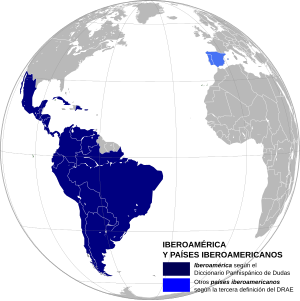Ibero-America

Ibero-America(Spanish:Iberoamérica,Portuguese:Ibero-América) orIberian Americais generally considered to be the region in theAmericascomprising countries or territories where Spanish or Portuguese are predominant languages (usually formerterritoriesof Spain or Portugal). Spain and Portugal are themselves sometimes included in some Ibero-American diplomatic circles, such as theIbero-American Summitand theOrganization of Ibero-American States.The Organization of Ibero-American States also includes Spanish-speakingEquatorial Guinea,inCentral Africa,[1][2]but not thePortuguese-speaking African countries.TheLatin Recording Academy,the organization responsible for theLatin Grammy Awards,also includes Spain and Portugal as well as the Latino population of Canada and the United States in their definition of Ibero-America.[3]
The prefixIbero-and the adjectiveIberianrefer to theIberian Peninsulain Europe, which includes Portugal and Spain. Ibero-America includes allHispanic Americancountries inNorth,Central,andSouth Americaplus theHispanophone Caribbean,as well asPortuguese-speakingBrazil. Ibero-America makes up the overwhelming bulk of and is synonymous with the common definition ofLatin America,but is differentiated from the expanded definition of Latin America by the exclusion of the French-speaking country ofHaiti,theFrench overseas departmentsofFrench Guiana,MartiniqueandGuadeloupe,and theFrench collectivitiesofSaint MartinandSaint Barthélemy,which are sometimes included in a few definitions of Latin America.BelizeandGuyana,whose official language is English, and Dutch-speakingSuriname,Aruba,Bonaire,Curaçao,Saba,Sint Eustatius,andSint Maartenare usually not considered to be either Ibero-American or Latin American.
Since 1991, theIberoamerican Community of Nationsorganizes a yearlyIbero-American Summitmeeting of the heads of state and governments of the Ibero-American countries, including Spain, Portugal andAndorra,[4][5]this has since changed to biannually from 2014.
Countries and population in Ibero-America
[edit]
- Spanish-speaking: (430,567,462 speakers)
 Argentina:47,327,407
Argentina:47,327,407 Bolivia:12,186,079
Bolivia:12,186,079 Chile:19,629,588
Chile:19,629,588 Colombia:52,085,170
Colombia:52,085,170 Costa Rica:5,044,197
Costa Rica:5,044,197 Cuba:11,089,511
Cuba:11,089,511 Dominican Republic:11,434,005
Dominican Republic:11,434,005 Ecuador:17,483,326
Ecuador:17,483,326 El Salvador:6,602,370
El Salvador:6,602,370 Guatemala:17,980,803
Guatemala:17,980,803 Honduras:9,571,352
Honduras:9,571,352 Mexico:129,875,529
Mexico:129,875,529 Nicaragua:6,359,689
Nicaragua:6,359,689 Panama:4,337,768
Panama:4,337,768 Paraguay:6,218,879
Paraguay:6,218,879 Peru:34,352,720
Peru:34,352,720 Puerto Rico(U.S. Commonwealth): 9,110,869 (Puerto Rico & Mainland United States)
Puerto Rico(U.S. Commonwealth): 9,110,869 (Puerto Rico & Mainland United States) Uruguay:3,444,263
Uruguay:3,444,263 Venezuela:30,518,260
Venezuela:30,518,260
- Portuguese-speaking: (227,661,177 speakers)
 Brazil:203,062,512
Brazil:203,062,512
See also
[edit]- Iberian Peninsula
- Hispanic America
- Latin Recording Academy
- Organization of Ibero-American States
- Organización de Telecomunicaciones de Iberoamérica(OTI)
- Spanish colonization of the Americas
- Portuguese colonization of the Americas
- Postal Union of the Americas, Spain and Portugal
References
[edit]- ^Presentación,Acerca de la OEI, Organización de Estados Iberoamericanos para la Educación, la Ciencia y la Cultura. Accessed on line October 22, 2007.
- ^PaísesArchived2007-11-12 at theWayback Machine,Cumbres Iberoamericanas de Jefes de Estado y de Gobierno. Accessed on line October 22, 2007.
- ^Abaroa, Gabriel (2019)."The First Twenty Years".20a Entrega Anual del Latin Grammy.The Latin Recording Academy: 6.RetrievedJuly 20,2022.
- ^Ibero-American SummitArchived2007-12-06 at theWayback Machine,Foreign Office, Republic of Brazil. Accessed on line October 22, 2007.
- ^pp. 312–313,Spain: Democracy Regained,Ergasto Ramón Arango, Spain: Westview Press.ISBN0-8133-2915-9.
External links
[edit]- Official website of the Organization of Ibero-American States (OEI)(in Spanish)
- Official website of Ibero-America's Secretariat General (SEGIB)(in Spanish)
- Official website of the Organization of Ibero-American Youth (OIJ)(in Spanish)
- Digital history of Ibero-America from the 14th to the 18th century(in Spanish)
- La Insignia,news about Ibero-America(in Spanish)
- Pensar Iberoamerica,cultural magazine about Ibero-America(in Spanish)
- Official website of El Ojo de Iberoamerica,one of the most important festivals devoted to Ibero-America(in Spanish)
